Iron Age - Available - Middle East - Photo gallery
Image database with photographs of ancient art and antiquities
Our image database provides photographs of ancient art and antiquities for press releases as well as for private use. All artefacts sold in our gallery are documented through professional photographs. The resulting image library contains numerous ancient Egyptian, Greek and Roman antiquities as well as ancient coins. The time span from Stone Age, over Bronze Age and Classical Antiquity until Late Antiquity is covered.The photo gallery aims at providing a vast visual archive equipped with filters and search tools. You are most welcome to search the constantly growing number of artefacts in the image library. We are also happy to authorize hyperlinks from your webpage / forum to the objects depicted in our gallery. For this purpose, please send us a short notification prior to placing a hyperlink. For almost every object high definition photographs are available and can be provided e.g. to document your collection or for scientific papers or popular science articles. If you are interested in using pictures for publications, print media or other purposes, please contact us and we will be happy to assist you.
-
 Horse bit from Luristan
Horse bit from LuristanDelightful artefact attesting the dawn of horse breeding in Western Iran during the 8th century BC. Highly stylized horses form the cheek pieces.

 Etruscan Vetulonia type helmet
Etruscan Vetulonia type helmetFrom the possession of New York City antiquities dealer Sumner Healey, who was made famous by Berenice Abbott's scenic photograph from 1936.
 Horse bit from Luristan
Horse bit from LuristanDelightful artefact attesting the dawn of horse breeding in Western Iran during the 8th century BC. Figural decorations form the cheek pieces.
 Funerary statuette for Princess Henuttawy
Funerary statuette for Princess HenuttawyThe Egyptian shabti is from the daughter of Pinudjem II who ruled Egypt during the Third Intermediate Period. It was excavated in the 1840ies at the Ramesseum.
 Stamp seal with handle
Stamp seal with handleInteresting Iron Age II seal with schematically engraved animals and humans. The seal is from southern Anatolia or northern Syria.
 Egyptian faience statuette of a baboon
Egyptian faience statuette of a baboonThe small work of art dates to the Late Period of ancient Egypt. It is worthy to be displayed at a major museum. Published in two works on the famous Epstein collection.
 Sword of the Urnfield culture from a museum collection
Sword of the Urnfield culture from a museum collectionWonderfully preserved bronze weapon from the time around 1000 BC. It was made in Central Europe by the Urnfield culture and formed part of a museum collection for almost 70 years.
 Egyptian scarab
Egyptian scarabThe scarab is made of nice marbled stone. Schematical upper side, structured, unengraved bottom side. From the Late Period of Ancient Egypt.
 Egyptian faience statuette of Taweret
Egyptian faience statuette of TaweretTypical depiction of the protective goddess for pregnant women. A piece of superior quality and great detail. From the Late Period of Ancient Egypt.
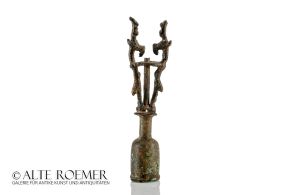 Luristan bronze standard with ibexes
Luristan bronze standard with ibexesBronze standard with stand from Iron Age Northern Iran. Decorated by a pair of ibexes. Possibly a teraphim, a house god, as referred to in the Old Testament.
 Luristan bronze dagger with crescent decoration
Luristan bronze dagger with crescent decorationBronze weapon originating from the Luristan region during Iron Age. With nicely decorated and sturdy blade.
 Large early Etruscan boat-shaped fibula
Large early Etruscan boat-shaped fibulaThe magnificent specimen stands out due to its rich and beautiful decorations. The boat-shaped type, also known as the Navicella fibula, was known in the regions around the Alps roughly 700 BC.
 Magnificent spectacle brooch from Greece
Magnificent spectacle brooch from GreeceThe very large bronze brooch was made between the 9th and 6th century BC. It is formed by a single piece of wire. With an old expertise from Nefer Gallery.
 Bronze statuette of Osiris
Bronze statuette of OsirisFantastic preservation of the figurine with stunning fine details and well preserved inlaid eyes made of Silver. Late Period of ancient Egypt.
 Luristan dagger blade
Luristan dagger bladeDouble-edged bronze blade of a short dagger from the Luristan region in Ancient Iran.
 Luristan bronze dagger
Luristan bronze daggerDouble-edged blade of a short dagger from the Luristan region in Ancient Iran.
 Egyptian bronze statuette of Amun
Egyptian bronze statuette of AmunIt impresses by its size and artistic quality. An inscription identifies the piece as votive offering at one of Amun's temples. From the Late Period of Ancient Egypt.
 Large Egyptian sarcophagus mask
Large Egyptian sarcophagus maskMagnificently painted wood relief of an idealized face. A piece of outstanding size and quality. The mask was part of a sarcophagus lid from Ancient Egypt.
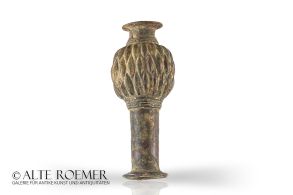 Luristan macehead
Luristan maceheadThe bronze head belonged to a club that was probably worn like a badge of rank in military parades. Very similar finds come from War Kabud and Chamzhi Mumah in what is now Iran.
 Luristan bronze dagger
Luristan bronze daggerIron Age bronze weapon originating from the Luristan region in Ancient Iran. Well preserved.
 Egyptian faience figurine of Pataikos
Egyptian faience figurine of PataikosWonderfully detailed protective amulet from Ancient Egypt. The dwarf god stands on crocodiles with daggers in his hands. Ex-Sotheby's.
 Small Phrygian gold fibula
Small Phrygian gold fibulaThe richly decorated brooch is a wonderful miniature work of art. It is from the 8th or 7th century BC, when the empire of the Phrygans was at its height. The time when the legends around King Midas spawned.
 Iron Age bronze belt
Iron Age bronze beltWide bronze belt with five wild animals in repoussé. From the biblical land of Ararat, the Urartian Empire around 700 BC.
 Luristan bronze dagger
Luristan bronze daggerIron Age bronze weapon originating from the Luristan region in Ancient Iran. Well preserved.
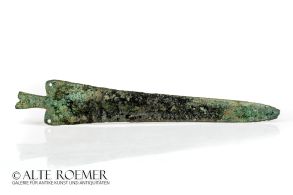
 Near Eastern spearhead
Near Eastern spearheadDouble-edged blade of a spear from Bronze or Early Iron Age. With a nice green patina.
 Horse bit from Luristan
Horse bit from LuristanDelightful artefact attesting the dawn of horse breeding in Western Iran during the 8th century BC. Two joined triangles form the cheek pieces.
 Sword from the Hallstatt period
Sword from the Hallstatt periodImpressive bronze weapon from the Early Iron Age around 700 BC. Made in the region of today's Germany or surrounding countries.
 Four Scythian arrow heads
Four Scythian arrow headsGroup of four arrowheads made of bronze in excellent condition. Popular weapon of the cultures of the 1st Millennium BC.
 Bronze dagger from North Iran
Bronze dagger from North IranShort bladed weapon from Iron Age Iran. It is probably a find from the province of Gilan in northern Iran.
 Published Canaanite oil lamp from Adler collection
Published Canaanite oil lamp from Adler collectionShallow bowl with pinch for the wick, typical for the late Iron Age in Southern Israel. From the famous Judge Dr. Steve Adler collection. Exported from Israel with IAA permit Nr. 53397.
 Luristan hatchet with eyes
Luristan hatchet with eyesAxe head originating from the Luristan region during Iron Age. The piece is decorated with eyes to form a stylized bird's head.
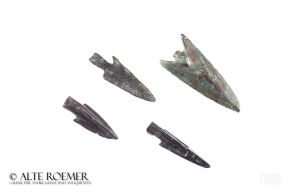 Four Scythian arrow heads
Four Scythian arrow headsGroup of four arrowheads made of bronze in excellent condition. Popular weapon of the cultures of the 1st Millennium BC.
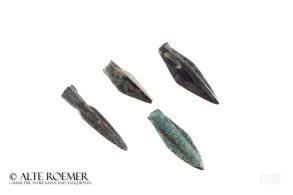 Four Scythian arrow heads
Four Scythian arrow headsGroup of four arrowheads made of bronze in excellent condition. Popular weapon of the cultures of the 1st Millennium BC.
 Very large Italic wave-shaped brooch
Very large Italic wave-shaped broochMade from bronze wire. A very rare brooch type from around 1000 BC.

